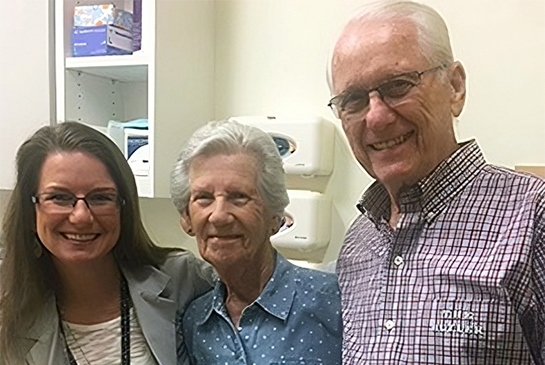Mary Barber

City-wide Program Unites Oncologists to Treat Tough Tumors
SCOPE-ing out the options
In late 2017 Mary Barber experienced two bile duct blockages and was scheduled for a Whipple procedure that December. What began as a surgery to remove the head of her pancreas, the first part of her small intestine, her gallbladder and bile duct, ended in a crushing discovery – a cancerous tumor.
Samer Shihabi, Barber’s primary oncologist at Mercy Cancer Center, shared information with her about a clinical trial available at UC Davis Health and encouraged her to participate. The great-grandmother of seven wasted no time and contacted UC Davis oncologist May Cho who specializes in gallbladder cancer. The trial is for patients with untreated, locally advanced or metastatic bile duct and/or gallbladder cancer that cannot be addressed surgically.
The successful coordination of Barber’s care is the result of the Sacramento Citywide Oncology Phase I program (SCOPE), a partnership among oncologists in the region’s health systems to offer access for any medically eligible patient to Phase I clinical trials at UC Davis, the only cancer center in the region with the necessary expertise and infrastructure to run early-phase trials.
In March 2018, Barber enrolled in the trial and received the investigational drug pegvorhyaluronidase alfa in combination with chemotherapy (cisplatin plus gemcitabine) and immunotherapy (atezolizumab). Cho is trying to learn whether the investigational drug and immunotherapy improve the effectiveness of standard chemotherapy combinations.
Cho acknowledges that some patients are afraid to join clinical trials, but recommends they ask their physicians if clinical trial participation is an option and then make informed decisions together.
“These days, trials are often the earliest way to get effective therapies,” said Cho. “There is a misconception that older patients cannot tolerate chemotherapy. She (Barber) is 83 and is doing fine.”
For the retired social worker participation offered the chance to help others while improving her own odds against the disease.
“You can’t really believe everything you hear (about clinical trials),” Barber. “There were several reasons why I enrolled. First, it was highly recommended. Second, the idea that it may or may not benefit me was okay, but looking ahead I knew the research would benefit others.”
Barber has experienced few side effects from the intensive routine, which requires visits to the UC Davis Comprehensive Cancer Center several days each week. She rests more often than before and has some fatigue, especially at the beginning of each treatment cycle. Barber and Cho were thrilled to learn that her tumor had shrunk by 50 percent after two months of treatment.
Teamwork was critical to Barber’s treatment. The SCOPE program manager coordinated with Shihabi to transfer Barber’s medical records to UC Davis. Cho reviewed them and agreed Barber was likely eligible for the study. Shihabi and Cho are both SCOPE clinical members.
“The collaboration between the two physicians is a prime example of the vision for the program,” Johnston said.
The time commitment of clinical trial participation doesn’t keep Barber down. She loves the outdoors, the Sacramento Kings, San Francisco 49ers and Giants, and looks forward to spending time with her large family. As soon as possible, Barber, her husband and their Calico cat will travel with their trailer in tow to a state park or the California coast.
“Everyone involved alleviated my fears,” Barber said. “From the doctors to infusion room staff to the clinical research coordinator – everyone is awesome. Great care, great people.”

